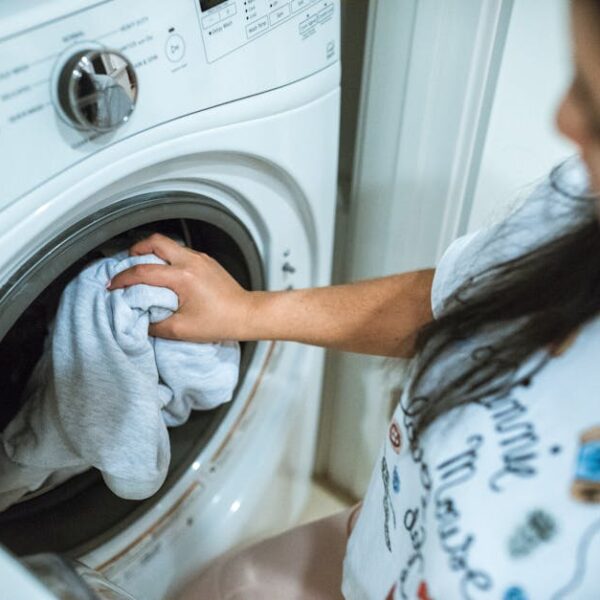Whether you have a municipal sewage system or use a septic tank, your laundry should not put a strain on either system. The best choice is to opt for septic-safe detergents, those specifically designed to prevent damage. So, what about Kirkland Laundry Detergent? Is it septic safe?
Understanding Septic Safe Laundry Detergents
Septic safe laundry detergents are formulated to completely break down and are readily soluble, avoiding the build-up that can affect the optimal functioning of your septic system. Ingredients such as surfactants, brighteners, and fragrances, usually found in regular laundry detergents, can harm your septic system. Elements like these can cause overactive bacterial growth or even form a layer of sludge, leading to potential system failure if left unchecked.
Pro Tip: To identify septic safe laundry detergents, look for labels that say ‘biodegradable’ or ‘plant-based.’ This indicates the product contains ingredients that can break down adequately in your system.
Components of Kirkland Laundry Detergent
Kirkland Laundry Detergent, a Costco’s brand, is known for its affordability and effectiveness in cleaning clothes. But, does it pass the septic safe test? Here’s what you need to know.
Primarily, the detergent contains active enzymes that are effective in breaking down stains yet gentle enough not to disrupt the biological balance of your septic system. However, Kirkland Laundry Detergent also contains surfactants. While these aid in removing dirt and stains, they are known to be possibly harmful in high concentrations to septic systems.
Pros:
- Contains enzymes that are septic safe.
- Affordable and value-for-money.
Cons:
- Contains surfactants which can potentially harm septic systems if present in high concentrations.
Evaluation of Kirkland Laundry Detergent’s Septic Safety
When it comes to the septic safety of Kirkland Laundry Detergent, it’s a mixed bag. While the enzymatic components are beneficial, the presence of surfactants raises eyebrows. Given their potency in removing dirt and grime, surfactants can disrupt the natural decomposition process within a septic system.
Best Practices:
- Avoid overuse of detergent: Less is often more.
- Regularly monitor your septic system: anything unusual could indicate an issue.
- Avoid draining non-biodegradable items to keep your system functioning optimally.
Checklist:
- Read the label carefully: Ensure the detergent is labeled septic safe.
- Notice if there are any changes after switching.
- Regularly inspect your septic system for any irregularities.
Expert Opinions on Kirkland Laundry Detergent’s Septic Safety
Various experts have weighed in on the septic safety of Kirkland Laundry Detergent. While some experts praise its effectiveness and affordability, many are hesitant due to the presence of surfactants.
Some experts recommend using an ‘organic’ or ‘all-natural’ detergent instead. These alternatives are often free of the harmful substances like surfactants, and they tend to be more septic friendly.
Checking out how Kirkland stacks up to other detergents:
| Brand | Septic Safe | Affordability |
|---|---|---|
| Kirkland Laundry Detergent | ⚠️ | ✅ |
| Organic Detergent Brand | ✅ | ⚠️ |
Maintaining Septic System Health While Using Laundry Detergents
No matter which laundry detergent you prefer, maintaining septic system health should always come first. Here are some ways you can ensure your system stays at its best:
- Regular Maintenance: Have your septic system inspected annually.
- Mind What Goes Down: Be conscious of what is being sent through your system. Avoid non-biodegradable materials and toxic substances.
- Water Conservation: Overloading the septic system with too much water can affect its functioning. This overload can also occur due to excessive laundry loads.
- Natural Detergents: If possible, opt for biodegradable and organic detergents.
Pro Tip: Identified by a small tree icon, using toilet paper that’s septic safe can significantly impact your system’s longevity.
In conclusion, while some components of Kirkland Laundry Detergent may not be ideal for septic systems, with careful usage and regular maintenance, it doesn’t have to spell disaster for your system. Just remember our top tips to ensure your septic system continues to function efficiently.
Key Takeaway:
- Septic safe laundry detergents are designed to break down effectively, preventing buildup and potential issues with your septic system. Ingredients like surfactants, brighteners, and fragrances can harm these systems.
- Kirkland Laundry Detergent’s constituents, such as active enzymes, are helpful for septic systems, but it also contains surfactants, which can be harmful.
- The septic safety of Kirkland Laundry Detergent is debatable due to the surfactants present in it.
- Regular monitoring of your septic system can help identify potential problems early.
- Experts recommend using organic or all-natural detergents as they are free from harmful surfactants and more septic friendly.
- Septic system health should always be a priority, hence regular maintenance, mindful usage, water conservation, and using natural detergents can help ensure system longevity.
Let’s not forget, while certain components of Kirkland Laundry Detergent may not be the best for septic systems, careful usage and regular maintenance can help mitigate any potential problems. Remember to go for septic-safe products and maintain regular monitoring of your system’s health.
FAQs
Q: What other laundry detergents are septic safe?
A: Many brands produce septic safe laundry detergents. Ensure the product is labeled as ‘biodegradable’ or ‘plant-based’ for the best results. Some popular brands include Seventh Generation, Mrs. Meyer’s, and Biokleen, among others.
Q: What harmful impacts can surfactants have on septic systems?
A: Surfactants can disrupt the natural decomposition process within a septic system and, if present in high concentrations, lead to system failure by forming a layer of sludge or promoting overactive bacterial growth.
Q: Can I use Kirkland Laundry Detergent with a municipal sewage system safely?
A: While the municipal sewage systems are equipped to handle a broader range of substances, using septic safe laundry detergents like those that are bio-degradable or plant-based is still recommended to reduce the environmental impact.
Q: How often should I monitor my septic system health?
A: Regular monitoring of your septic system is advised. At a minimum, you should have your system inspected annually. However, if after switching to a new detergent you notice any irregularities, an immediate check would be advisable.
Q: Besides using septic-safe detergent, how else can I prolong the life of my septic system?
A: Other measures include regular maintenance, avoiding the drainage of non-biodegradable items, conserving water, and using septic-safe toilet paper.
Do share this post if you found it helpful, and explore more of our insightful articles for other useful tips and information.












